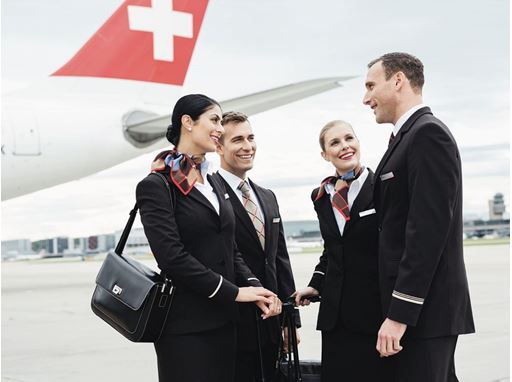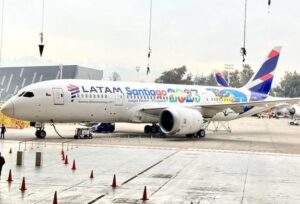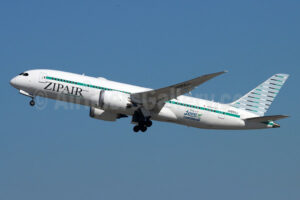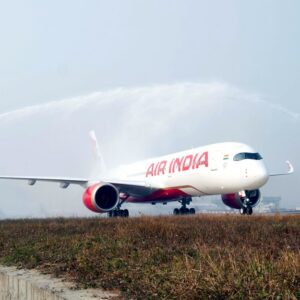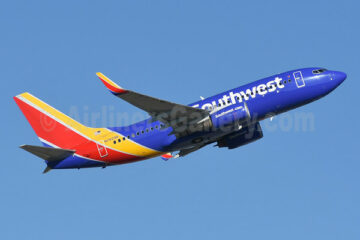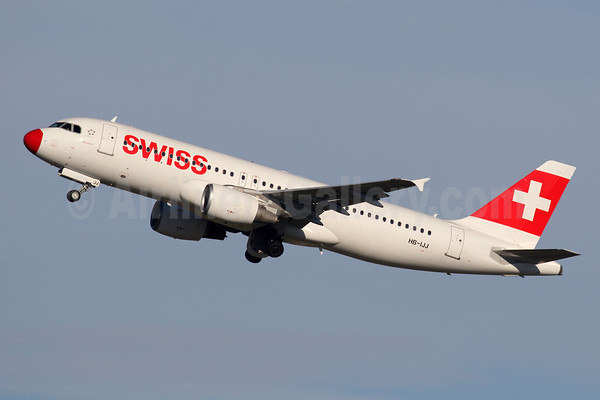
SWISS’s cabin personnel will be working under a new collective labour agreement (CLA) from 1 January 2024. The members of the kapers cabin crew union have approved the proposed new CLA by referendum by a 79,1-per-cent majority. The new agreement marks the final milestone in SWISS’s post-corona recovery, and lays a sound foundation for a successful future. The new CLA provides SWISS’s cabin crew members with various improvements in both monetary and quality-of-life terms. SWISS will invest a total of CHF 200 million in the benefits concerned over the next five years.
The members of the kapers cabin crew union have approved by referendum the proposed new CLA24 collective labour agreement for the cabin personnel of Swiss International Air Lines (SWISS). With a voter turnout of 87,6 per cent, 79,1 per cent of the referendum votes cast were in favour of the CLA’s acceptance. SWISS and kapers had reached agreement on the new CLA at the beginning of November. In addition to salary increases, CLA24 provides numerous improvements in cabin crew members’ working terms and conditions, and better addresses the individual needs of the SWISS cabin crew corps of some 3,500 employees.
“I am delighted that CLA24 has been approved by the members of kapers, and by such a substantial majority,” says SWISS CEO Dieter Vranckx. “This positive referendum result confirms to us that our new collective labour agreement for our cabin personnel lays a sound foundation on which we can build and shape a successful shared future. For us at SWISS, this agreement also marks the final milestone in our post-corona recovery. And under the benefits it brings, we’ll be investing a total of some CHF 200 million in our cabin crew corps over the next five years. Our cabin staff make a huge contribution to our company’s success. So I’m all the more pleased that, with our new CLA, we can now tangibly improve their working terms and conditions.”
Higher salaries, greater plannability and more individual choice
Under the new CLA24, all SWISS cabin crew members will have their full-time basic monthly salary raised by CHF 400. The new CLA also incorporates a two-per-cent inflation-based salary increase and higher expenses rates. In addition, from their third year of service onwards, cabin crew members can choose to receive either a variable compensation component that is linked to SWISS’s business results or a guaranteed partial (and later full) 13th monthly salary payment. And in a further innovation, standby duties are now also remunerated.
In addition to monetary improvements, SWISS is also investing in the quality of life of its cabin crew members under the new CLA. Their monthly duty rosters will now be published one week earlier, on the 18th of the previous month, to help them better plan their social lives. They will also be assigned seven fixed free days in each monthly roster. The time within which standby staff are required to report for duty if necessary has also been increased. And CLA24 further offers new part-time working models, such as models tailored to parents’ or students’ needs.
In other news, Swiss has announced its aircraft fleet is back at full strength with the return to flight operations of the last aircraft which had been placed in long-term storage in response to the corona crisis. The aircraft, Airbus A320 HB-IJO, returned on Sunday from Amman in Jordan, and operated its first passenger service on December 19 after three years in the desert. SWISS put a total of 25 aircraft into storage in Amman in view of the coronavirus pandemic.
Swiss International Air Lines (SWISS) stored 25 of its aircraft in Amman, Jordan during the coronavirus pandemic as a logistical response to the consequent collapse in travel demand. The SWISS fleet was restored to full operating strength today, though, with the return to revenue service of Airbus A320 HB-IJO, the last of these stored aircraft. Following a thorough inspection by a specially trained SWISS crew, the aircraft left Amman on Sunday after 1.180 days in the desert and was flown back to Zurich. It returned to passenger service this (Tuesday) morning, departing from Zurich with flight LX974 to Berlin at 08:12.
25 aircraft stored
SWISS experienced a huge slump in demand for its services during the coronavirus pandemic, and was compelled to massively reduce its flight operations from spring 2020. As part of this response, 25 SWISS aircraft were stored in the Jordanian desert. Under the leadership of SWISS’s own technical specialists and in collaboration with the local maintenance, repair and overhaul provider, all the aircraft stored were subjected to regular inspections of their installed equipment. Further ongoing attention included regular flushing of the hydraulic systems and engine function checks. Jordan’s hot and arid climate is especially conducive to the long-term storage of aircraft, as the low humidity provides optimum protection against any rusting of their metal components.
HB-IJO in brief
Airbus A320-200 HB-IJO was built in 1997 and is one of SWISS’s longest-serving aircraft, having been operated by the company since its foundation. The twinjet seats 180 passengers, and has performed some 63,596 flight hours and 45,042 takeoff/landing cycles in its more than 26 years of airline service.
Top Copyright Photo: Swiss International Air Lines Airbus A320-214 HB-IJJ (msn 585) (red nose) ZRH (Andi Hiltl). Image: 962126.
Swiss aircraft photo gallery:
- SEO Powered Content & PR Distribution. Get Amplified Today.
- PlatoData.Network Vertical Generative Ai. Empower Yourself. Access Here.
- PlatoAiStream. Web3 Intelligence. Knowledge Amplified. Access Here.
- PlatoESG. Carbon, CleanTech, Energy, Environment, Solar, Waste Management. Access Here.
- PlatoHealth. Biotech and Clinical Trials Intelligence. Access Here.
- Source: https://worldairlinenews.com/2023/12/20/new-collective-labor-agreement-approved-by-cabin-personnel-swiss-lays-foundation-for-a-successful-shared-future-brings-back-its-last-stored-aircraft/
- :has
- :is
- 08
- 1
- 12
- 180
- 19
- 200
- 2020
- 2024
- 25
- 26
- 400
- 500
- 87
- a
- acceptance
- addition
- addresses
- After
- against
- Agreement
- AIR
- Airbus
- aircraft
- airline
- All
- also
- am
- and
- announced
- any
- approved
- ARE
- AS
- assigned
- At
- attention
- back
- basic
- BE
- been
- Beginning
- benefits
- berlin
- Better
- both
- Brings
- build
- built
- business
- by
- CAN
- cent
- ceo
- Checks
- chf
- Choose
- Climate
- collaboration
- Collapse
- Collective
- COM
- company
- Company’s
- compelled
- Compensation
- component
- components
- concerned
- conditions
- contribution
- copyright
- Corona
- Coronavirus
- Coronavirus pandemic
- crew
- crisis
- cycles
- Days
- December
- delighted
- Demand
- DESERT
- during
- each
- Earlier
- either
- employees
- Engine
- equipment
- especially
- expenses
- experienced
- final
- First
- five
- fixed
- FLEET
- flight
- following
- For
- Foundation
- Free
- from
- full
- function
- further
- future
- Gallery
- greater
- guaranteed
- had
- Have
- having
- help
- High
- higher
- HOT
- HOURS
- HTTPS
- huge
- if
- image
- improve
- improvements
- in
- included
- incorporates
- Increase
- increased
- Increases
- individual
- Innovation
- International
- into
- Invest
- investing
- IT
- ITS
- January
- Jordan
- jpg
- labor
- Labour
- Last
- later
- Lays
- Leadership
- left
- Life
- lines
- linked
- Lives
- local
- long-term
- Low
- maintenance
- Majority
- make
- massively
- max-width
- Members
- metal
- milestone
- million
- models
- Monetary
- Month
- monthly
- more
- morning
- MSN
- necessary
- needs
- New
- news
- next
- nose
- November
- now
- numerous
- of
- Offers
- on
- ONE
- ongoing
- onwards
- operated
- operating
- Operations
- optimum
- or
- Other
- our
- over
- Overhaul
- own
- pandemic
- part
- payment
- per
- performed
- Personnel
- photo
- placed
- plan
- plato
- Plato Data Intelligence
- PlatoData
- pleased
- positive
- previous
- proposed
- protection
- provider
- provides
- published
- put
- quality
- raised
- Rates
- reached
- receive
- recovery
- Red
- reduce
- referendum
- regular
- repair
- report
- required
- response
- restored
- result
- Results
- return
- revenue
- roster
- salaries
- salary
- says
- service
- Services
- seven
- Shape
- shared
- since
- Slump
- So
- Social
- some
- Sound
- specialists
- specially
- spring
- Staff
- storage
- stored
- strength
- substantial
- success
- successful
- such
- sunday
- Swiss
- Systems
- tailored
- Technical
- terms
- terms and conditions
- than
- that
- The
- the cabin
- their
- Them
- These
- they
- Third
- this
- though?
- three
- time
- to
- today
- Total
- trained
- travel
- Tuesday
- under
- union
- us
- variable
- various
- View
- Voter
- votes
- was
- we
- week
- were
- which
- will
- with
- within
- working
- year
- years
- zephyrnet
- Zurich

